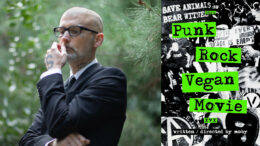The musician Moby wants people to stop eating animals — and he’s recruited a few dozen performers from the punk rock scene to help explain why.
Moby’s new documentary, Punk Rock Vegan Movie, casts the punk music of the late 1970s and 1980s as one of the primary seeds of today’s animal-rights movement. Bands like Crass, Bad Brains, the Cro-Mags and Earth Crisis led vegetarian or vegan lifestyles, raged against animal cruelty in their songs or on stage, included animal liberation messages on their physical albums and at their merchandise tables, and inspired a generation of activists and musicians that followed.
“It’s a surprising story,” Moby tells The Revelator. “This genre of super-loud, aggressive punk rock is actually where a lot of animal-rights activism came from.”
View this post on Instagram
The punk scene, as shown in the film, embraced social justice with an ethos of questioning authority and the status quo, standing up against cruelty and injustice, and living ethical lives.
And that, Moby says, offers lessons that still resonate as loudly as the songs, especially when it comes to animal rights.
“If you’re a smart, reasonable person, an extension of that should be questioning everything,” he says. “And once you start to question things, one of the first things that falls apart under scrutiny is where our food comes from.”
Animal agriculture, the film points out, is one of the primary drivers of the extinction crisis and climate change. The animals themselves suffer horrible lives and deaths, while their sentience is ignored. Diseases run rampant, and pollution from industrial farms harms workers and nearby communities.
In the face of that harsh reality, many of the musicians interviewed in the documentary portray punk as a form of resistance against capitalist oppression and unjust systems. For bands like Youth of Today, that meant taking on the food system in hardcore songs like “No More,” where they sang “When the price paid is the life of something else / No more / I won’t participate.”
Punk, meanwhile, served as its own ecosystem, allowing communities of like-minded people — many of whom were already feeling alienated from or rebelling against society — to find each other, to learn from each other, and to protest and take other forms of collective action.
The music scene was hardly alone on that front, of course, but it echoed other avenues for progress.
“Every change-oriented movement, every activist movement, has required that sort of incubating community,” Moby says. “That women should have the right to vote, or that humans should not be owned, or that people should be allowed to marry whomever they choose — all these notions, which are so ingrained in our culture at this point, at one point they were the most radical ideas you could possibly espouse. As a result, activists were beaten and thrown in jail.”
View this post on Instagram
“I really do see animals as being the next extension of that,” he continues. “The vegans now are the weird ones. And the fascinating thing is that everyone already agrees with us for the most part. People care about workers. They care about antibiotic resistance. They care about the rainforest, the climate, water use. They care about health costs. They care about animals. But then you say, ‘OK, so you’re a vegan.’ They’re like, ‘Well, no.’ Why aren’t you taking that logical next step and simply acting in accordance with your belief?”
But getting to that point isn’t always easy. Every person responds to different messaging. And stepping back from the status quo and going vegan can present unique, social challenges.
“One of the reasons it’s so hard for people to give up meat and dairy is because it’s simply choosing a degree of isolation and loneliness,” Moby says. “So the rebellion — and it is a central aspect of both activism and punk rock — is that idea that principles are what you’re committed to, even if it means potentially being lonelier, even if it means you’re not going to be invited to the barbecue, even if people are going to give you weird looks at Thanksgiving when you don’t eat the turkey and the ham. There is a loneliness to a principled existence.”
Perhaps that’s why so many misfits and nonconformists find solace in punk and other music — it tells them they’re not alone and gives them a shared direction.
That message from these vegan punk bands still resonates today, as does the music itself. But Moby says he also hopes viewers go beyond the music and embrace the punk ideal of questioning the status quo.
“I personally love the form of punk rock,” he says, “but what’s far more interesting that I hope I looked at in the movie is the function of punk rock, which is that idea of incredibly principled skepticism — not irrational, anti-vax skepticism, not irrational, angry skepticism for the sake of skepticism, but skepticism that has empirically supported rational and ethical criteria attached to it. Obviously punk rock does not have the exclusive rights to that type of skepticism, but I feel like our culture, to speak very broadly, is really missing that.”
That principled approach, ultimately, is the intent of the film.
“My hope is that people will be reminded of the important utility of skepticism and questioning and apply it to every aspect of our lives,” Moby says. “And as I say at the end of the movie, if things don’t conform to our ethics, if things don’t conform to our values, don’t support them. If there’s an easy alternative, and in this case a healthier alternative and a more environmentally sustainable alternative, just simply choose that.”
Punk Rock Vegan Movie is free on YouTube. Watch it below:
![]()
Previously in The Revelator:
Rage Against the Anthropocene: The Extinction Crisis Gets an ‘Eco-slam’ Soundtrack


